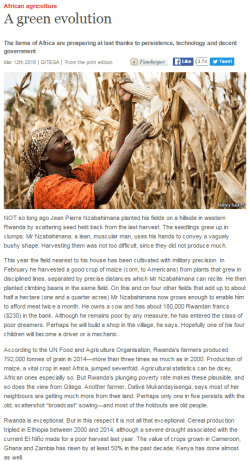
Policy highlights:
- A number of obstacles make sustainable development of agricultural production in Africa particularly difficult: The sector is very heterogeneous; no leap forward in the farming of a single crop can transform it; Africa has a sparse road network, making distribution and trade difficult; Government-imposed price controls and trade tariffs reduce farmers earnings; farmers have limited or no access to price information and hence get paid too little for their products
- Over the last decade, better managed and better fertilized crops from hybrid seeds have generated positive results for farmers across Africa, including small-scale farmers.
- Measures that can further enhance the impact of hybrid seeds: 1) Credit should be supplied to promote agricultural investments; 2) Farmers should be offered skill training; 3) Road infrastructure and mobile phone reception should be improved to ensure better access to markets and information; 4) Water hoarding and drip irrigation should be encouraged to deal with the risk of long-term drought; 5) The possibility for crop insurance that pays out in particularly bad seasons should be explored.








